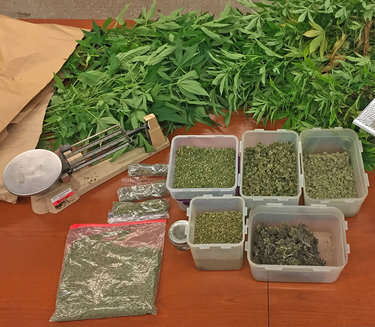Town law allows pot sales to adults
GUILDERLAND — In a split vote on Tuesday, the Guilderland Town Board adopted a law that will allow for cannabis dispensaries in town.
In April, the board had unanimously decided that pot parlors would not be allowed.
The board members on Tuesday agreed that the law they passed would be amended so that it is clear dispensaries will not be allowed in residential areas.
The concern was raised by Robyn Gray, a Guilderland resident who chairs the grassroots group Guilderland Coalition for Responsible Growth.
While Gray called the dispensaries “a great idea,” she said in terms of the law, “This is not spelled out far enough in terms of where they can go.”
Supervisor Peter Barber first responded that dispensaries would be allowed only in a local business district.
Gray said her concern was with mixed-use developments. For example, Gray said, as the law was written, a dispensary might be placed on the bottom floor of an apartment complex in a planned unit development, or PUD, where children may live.
Barber said that a PUD is approved by board discretion and said it is likely there would be just one dispensary in town.
“Who knows what happens down the road,” Gray countered.
The town attorney, James Melita, was concerned that a convenience store like Cumberland Farms might fit the criteria for a dispensary.
Resident Gerd Beckmann echoed that concern, surmising the way Stewart’s Shops now have a “beer cave,” there might be a “dope cave.”
Barber noted that customers cannot get into a marijuana dispensary without an identification check.
“I’m probably overthinking this,” Melita conceded.
“Better to be safe than sorry,” commented Councilwoman Amanda Beedle.
In the end, Barber, Beedle, and councilwomen Laurel Bohl and Christine Napierski voted in favor of the law, while Councilwoman Rosemary Centi cast the sole dissenting vote.
History
In April, the board had reversed its earlier decision to wait and see before allowing dispensaries.
The two councilwomen on the all-Democratic board elected since the original vote — Beedle and Napierski — voted with Barber to allow dispensaries.
Councilwomen Bohl and Centi stuck with their original votes.
Barber said the reason for revisiting the issue in April wasn’t just because of the new board members but because the original vote, last October, was taken before state regulations had been formulated. Barber had voted no with the rest of the board in October.
In April, Centi said she had done a lot of research, speaking to the police chief, to residents, and to the Colonie supervisor. She suggested revisiting the issue when more data was available.
Centi also said her son, who lives in Massachusetts, described the traffic near a dispensary there as “unbelievable.”
The state’s Marijuana Regulation & Taxation Act legalized adult recreational use of marijuana in March 2021. Anyone 21 and older may legally possess and purchase up to three ounces of marijuana and can have up to five pounds of marijuana at home.
Then, in March of this year, the state’s Cannabis Control Board voted unanimously to propose the regulations to allow the first retail licenses to be given to people who have been convicted of pot-related crimes or their relatives.
The April town board vote followed a spirited public hearing, with one town resident calling the move “regressive” and another terming it “progressive.”
Barber cited an estimate that Guilderland would bring in $185,000 once a dispensary is up and running. “I’d rather have the revenue because people are going to be buying it,” Barber said.
According to the state, the 4-percent tax that goes to the locality where the dispensary is located is apportioned based on sales — 1 percent is retained by the county and 3 percent goes to, or gets divided by, the municipality or municipalities with dispensaries.
Napierski said she favored dispensaries as “a way to right a wrong that happened in society.”
A disproportionate number of Blacks and Latinos were arrested and jailed when marijuana was illegal.
Beedle made a passionate personal plea based on her sister-in-law, who lives out of town, suffering from a brain tumor. Cannabis was the only thing that released her from “blinding, crippling pain,” Beedle said.
The law
The Guilderland Planning Board reviewed a draft of the law, the town’s eighth this year, at its May 25 meeting and voted, 6 to 0, in favor of it. Christopher Longo abstained as he had spoken in opposition of dispensaries at the April town board meeting.
The law defines a cannabis retail dispensary as “a business operating pursuant to a license issued under the New York State Cannabis Law and its regulations that authorizes the retail sale of cannabis products to adults.”
The dispensary has to be located in a store located on a public thoroughfare with an entrance at street level. It is to have legal access to a state highway.
A dispensary cannot be located within 500 feet of school grounds or the boundary of a town park, the law says, or within 200 feet of a house of worship.
On Sundays, the dispensary can operate only between noon and 7 p.m. The other six days of the week, it can operate between 9 a.m. and 9 p.m.
The final requirement is that the dispensary “shall comply with all laws and regulations of New York State relating to a cannabis retail dispensary.”



